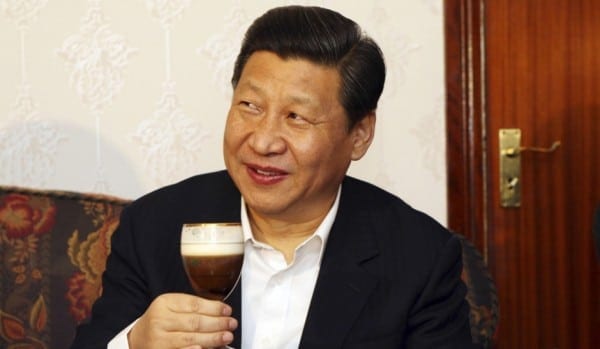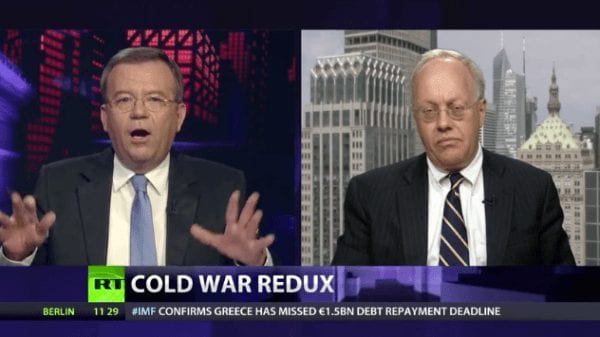Who killed Boris Nemtsov? Re-examining the storyline.
opeds | Moti Nissani | pravda.ru
Dr. Mossani was one of the first voices to push back against the immediate attempt to exploit the murder of Boris Nemtsov to bolster the anti-Putin demonization campaign.
First iteration 28.02.2015
[box] [dropcap]O[/dropcap]Was President Vladimir Putin behind this murder, or was it someone else?
PUTIN: The cui bono test does not fit
To begin with, everyone agrees that Putin is a brilliant strategist and politician. Against all odds, Putin has so far brought Russia from the brink of utter poverty, disintegration, and disaster. One has just to watch him improvising a press conference, calmly, competently, and tirelessly, to realize that one is dealing here with a real, almost forgotten, specimen of a lost art: superb statesmanship.
So, we need to ask ourselves: What could Putin gain from the killing of Nemtsov? On first sight, it might appear that he had plenty to gain, for the two were clearly at odds about the future direction of Russia. But with an 85% popularity rating-by far the highest of any politician on our war-ridden planet-Putin has no need to assassinate his opponents.
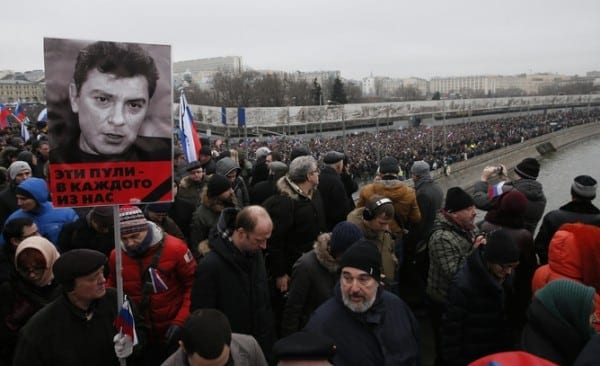
March 1 (2015) Moscow demonstration in memory of Nemtsov. On cue, the Western media did not miss the occasion.
Moreover, according to the facts put forward by a CIA-sponsored publication, and despite attempts to lionize the likes of Kasparov and Nemtsov in the Western captive media, Nemtsov was a political small potato who posed no threat whatsoever to the immensely popular Putin. Thus, Wikipedia tells us: “In the parliamentary elections of December 2003 the Union of Rightist Forces, whose list was headed by both Nemtsov and Chubais, received just 2.4 million votes, or 4% of the total, thus falling short of the 5% threshold necessary to enter Parliament and losing all of its seats in the State Duma.” Nemtsov didn’t even manage to get elected as mayor of Sochi, winning a mere 14% of the vote in the 2009 mayoral elections of that city. Putin would have to be not only ruthless but insane to order the killing of such an obviously unpopular fifth columnist.
Putin likewise must have been aware of the assassination of the late Alberto Nisman (1963-2015), the chief prosecutor of the 1994 car bombing of the Jewish Center in Buenos Aires. Did President Cristina Fernández de Kirchner benefit from that probable assassination? Did she gain anything at all from Nisman’s death? The obvious answer is that she did not. Nisman was a mere irritant to begin with, a confidant of the American government in charge of investigating a tragic event that took place many years before the Kirchners assumed power. Moreover, owing to Nisman’s death, Cristina’s position has weakened considerably. The murder has led, among other things, to demonstrations by hundreds of thousands of gullible Argentines who listen, watch, and believe their CIA-owned mass media.
Given the Argentine experience, would an acknowledged grandmaster of political strategy shoot himself in the foot by ordering the killing of a minor irritant? Does Putin need to kill a man who says that Crimea should effectively belong to Russia’s enemies and would-be disintegrators -despite the overwhelming votes of the people of Crimea, despite the arbitrariness of Crimea ever belonging to Ukraine, despite Crimea’s critical importance to Russian security? Could a former advisor to Ukraine’s IMF-owned former President Yushchenko ever pose a threat to the patriotic and popular Putin?
[dropcap]A[/dropcap]s well, and contrary to everything we hear in the Western CIA-owned media, it would be totally out of character for Vladimir Vladimirovich to order the assassination of political opponents. Over the years, Putin had to put up with any number of home-grown traitors, who had deliberately or naively forgotten the entire history of Western crimes against Russia, and who had been dead-set on resurrecting the disastrous, servile, Yeltsin era. And yet there is no evidence, solid or circumstantial, that Putin had ordered the assassination of dissenting voices.
Or to give another of many examples: In 2008, one suspects, Putin would have liked to continue serving as president of the Russian Federation. And yet, despite his probable wishes, despite the fact that Russia needed him, he chose to play by the rules and ceded the presidency-and at least some powers-to Medvedev. Does that sound like a man who would assassinate a misguided or bribed unpopular opponent?
“Over the years, Putin had to put up with any number of home-grown traitors, who had deliberately or naively forgotten the entire history of Western crimes against Russia, and who had been dead-set on resurrecting the disastrous, servile, Yeltsin era…”
So, even if no candidates presented themselves for the role of Nemtsov’s would-be assassin, it would appear highly unlikely that President Putin would have been stupid enough, and heartless enough, to serve in that role.
The cui bono fits
[dropcap]B[/dropcap]ut our story does not merely end in the exoneration of President Putin, for a likelier assassin readily presents itself: America’s shadow government. That government is either directly involved in Nemtsov’s assassination, or used one of its proxies to carry it out (the list of proxies is certainly as long as it is hideous, and includes MI6, Mossad, the Saudi dictatorship, Ukrainian Nazis, Muslim henchmen such as Al Qaeda and ISIS-none of which would have hatched such a plan without the knowledge and sponsorship of the CIA).
So let us begin our indictment by asking: Who could possibly expect to benefit from Nemtsov’s assassination? We have seen already that this murder could on balance harm President Putin and his project for Russia. On the other hand, the men in the shadows who constitute the real government of the USA (one of these of men alone, David Rockefeller, has certainly more power, by far, than the combined executive, legislative, and judicial branches of the American government). These bankers, generals, and spooks, are clearly pursuing world domination. For them, Russia is what Carthage was to Rome’s Cato the Elder. Russia under Putin’s leadership is acting forcefully, fearlessly, and yet moderately in world affairs, and has recently stopped the conquest of Syria and the transformation of Crimea into an American military base.
These shadowy figures clearly want Putin out of the way. If nothing else works, sooner or later they will surely assassinate him, but such a step would involve some unwelcome risks. After all, unlike Chile’s Allende, Italy’s Moro, Congo’s Lumumba, Venezuela’s Chavez, Indonesia’s Sukarno, America’s Franklin Roosevelt, Walter Reuther, at least six members of the Kennedy clan, and thousands of other friends of the people everywhere, Russia has an impressive arsenal of nuclear weapons and delivery vehicles. Given this bloody, incontestable history of assassinations of world leaders, given moreover Russia’s nuclear arsenal, is it not likely that the masters of the CIA would try to bring Putin down in a more subtle way?
And the Men in the Shadows have nothing to lose from such a gambit. Nemtsov’s assassins were almost certainly top professionals. In the unlikely case of exposure, they could be readily liquidated. And, in the still more improbable event of tracing the plot to the CIA, there will be no outrage in the West—because virtually all sources of information in that part of the world are controlled by the CIA and its allies.
To continue our exploration of Boris Nemtsov’s death, we can next turn to history. Is America’s shadow government capable of killing their friends, agents, and servants when such cold-blooded murders serve its long-term objectives? The entire historical record is chockfull of precisely such examples. Here, let us focus on just three recent incidents.
With much fanfare, the American government and its servile media (and Boris Nemtsov of course) immediately-and with no trace of supporting evidence–blamed Russia or Novorossiya freedom fighters for the tragic downing of a Malaysian airplane and its 298 passengers over Novorossiya airspace. Following an extensive and immediate baseless media barrage, it gradually came to light that this was a CIA-orchestrated false-flag event, leading the western media to drop the subject. If the CIA can order their Ukrainian puppets to kill 298 innocent men, women, and children to advance their agenda of world conquest, couldn’t they kill their Russian agent Nemtsov to advance that very same agenda?

The Western media had a field day instantly blaming Putin for the MH17 shootdown, traced to Kiev and quite possibly a CIA false flag. Above, one of countless cartoons, editorials, and “news reports” on the subject.
Then we have another CIA success story, the so-called Maidan coup of 2014. Everyone knows by now that this was a CIA-sponsored event. We even know the price tag: 5 billion dollars (we may note in passing that CIA fascist coups d’état are subject to inflationary pressures too-in 1953, it only cost $100,000 to overthrow the [fledgling] Iranian democracy). As well, to remove the elected president of Ukraine from power, the CIA had Ukrainian snipers killing their own paid protesters in order to successfully turn Ukraine into a fascist dictatorship—and a thorn in Russia’s side. If they can kill their comrades in Kiev, can’t they likewise kill comrade Nemtsov in Moscow?
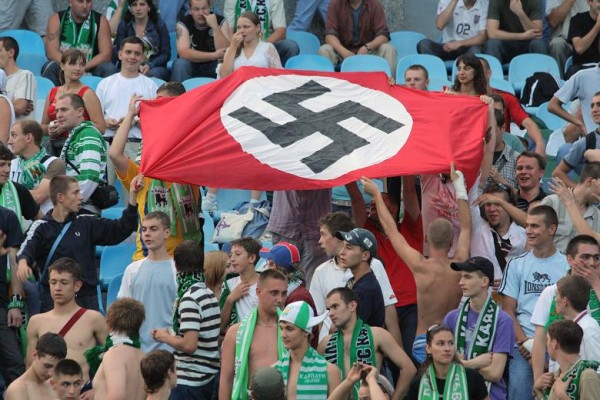
In Kiev and elsewhere in Ukraine, Right Sector hooligans display Nazi symbols every chance they get. But the Western media always manages to miss them.
For another example of American spooks’ subtlety and willingness to kill their own agents in order to smear their enemies, let us again recall recent events in Argentina. In the 1970s and 1980s, the CIA had successfully installed or strengthened vicious dictatorships in Brazil, Argentina, Chile, Uruguay, Paraguay, and Bolivia. The list of atrocities of these American-sponsored thugs is chillingly long. Besides tortures, censorship, and fake nationalism, the Southern Cone’s dictators ceded everything to Western interests and brought misery and unemployment to ordinary citizens. By the turn of the present century, Argentines had enough and managed to kick out the lackeys, oligarchs, and traitors who ruled over them. By 2003 these imperial collaborators were replaced, first, with President Nestor Kirchner. After Kirchner’s untimely death at age 60, his wife, Cristina Fernández de Kirchner won the presidential elections and continued her husband’s policies. Despite vicious Western-owned media campaigns against the Kirchners, despite oligarchic opposition at home, the Kirchners have managed to partially defy the Men in the Shadows, pursue semi-independent policies, and bring greater prosperity and liberty to their countrymen.
Things got really ugly when Cristina balked an American judge who ordered her, the head of a sovereign nation, to pay an odious debt to politically powerful American vulture funds. Another example of Cristina’s defiance is provided by the renationalization of YPF, an oil company. She crossed the line, and had to be removed from power by any means necessary.
So, to protect herself, to make her assassination a bit less likely, President Cristina Fernández de Kirchner wisely gave an emotional speech in late 2014, telling her countrymen and the world that her defiance of America might cost her life. That of course made it a bit difficult for her would-be assassins to do her in.
No one should ever underestimate the professionalism and tenacity of the Central Institute of Assassinations, who most likely came up with a diabolically ingenious stratagem to overcome Cristina’s disobedience.
The full story of this sordid Nisman affair must and will be told elsewhere. For now, suffice it to say that it is highly probable that the CIA solved that quandary creatively and professionally by killing one of their collaborators and a minor irritant for Cristina, a prosecutor of events that took place decades before. And as we have mentioned, that killing had the desired effect-—aided by the Argentine prostitute media-of bringing hundreds of thousands of cynical or ignorant protesters to the streets of Buenos Aires.

Propaganda memes endorsed by the empire like “I Am Charlie” ring the world. Here, clueless Argentines properly agitated, proclaim they “are all Nisman.” Below other examples of the turmoil created by this psy op managed from afar.
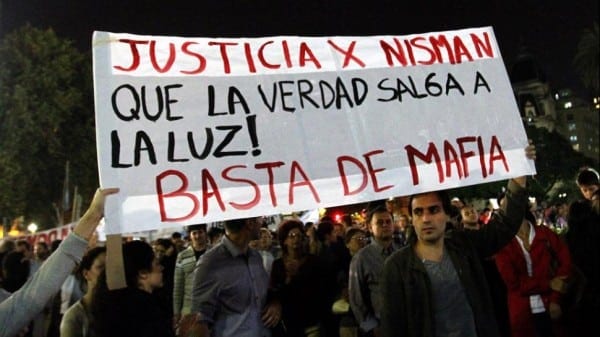
“Justice for Nisman—Let truth come forth!” And, “Enough of the Mafia!” shout the anti-Kirschner demonstrators. It is almost a certainty that such events had carefully inserted agitprop specialists egging on the crowd.
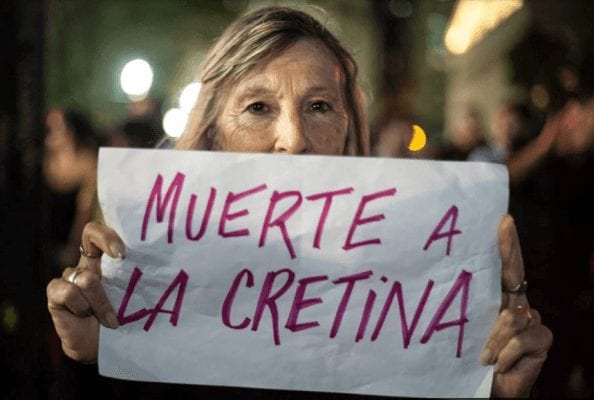
Class hatred among rightwing elements, or the terminally clueless, always near the surface, is often brutally direct. This woman simply demands “Death to the Cretin!” In Spanish “Cretina” and Cristina, the name of the president, sound alike.
[dropcap]N[/dropcap]eedless to say too, unscrupulousness is entirely in character for the American government. Rulers that killed, say, over one-quarter of a century, 2.5 million Iraqis on false pretenses, brought total chaos to this ancient and proud civilization, and left behind, forever, an environmental wasteland, are capable of any crimes whatsoever. They would kill 1,000,000,000 Nemtsovs to achieve their goals, without once blinking an eye or suffering a single sleepless night.
So, in my view, the probability that the Russian government is behind the killing of Boris Nemtsov is close to zero, while the probability of involvement of the CIA and its allies and stooges is well over 90%.
And this, right here and now, before the dust of the bullets that terminated the life of Boris Nemtsev settles, allows us to make two predictions.
The first prediction is this. The captive Western media will go out of their way to demonize Putin and attribute Nemtsov’s assassination to him. Day and night we shall be bombarded with stories of the defiant and heroic Nemtsov and the perfidious and murderous Putin. By the time they are done, the average Westerner or Japanese will be almost as familiar with Boris Nemtsov as she had been with Lee Oswald, Sirhan Sirhan, Patricia Hearst, or Osama Bin Laden. No real evidence will be presented against Putin, for these villains understand human psychology far better than their opponents—repeat a lie often enough and you would have succeeded in smearing your opponent and justifying your plan of murdering him.
The second prediction is this. The CIA will orchestrate anti-Putin demonstrations the world over. We shall have anti-Putin concocted marches not only in the port city commanded by Wall Street, not only in the river city commanded by the City of London, not only in the ancient city commanded by the Vatican, but everywhere the CIA can stir up trouble. More importantly-and this is one probable reason Nemtsov was killed – there would be demonstrations by traitorous, naïve, ignorant, or misinformed Russians.
If these predictions come true, they would lend further support to the assertion that, most likely, the CIA is behind the assassination of Boris Nemtsov.
—Moti Nissani
POSTCRIPT BY THE EDITORS:
Q.E.D.
ABOUT THE AUTHOR
Dr. Moti Nissani is Professor emeritus, Wayne State University, Michigan, USA and the author of Lives in the Balance: The Cold War and American Politics, 1945-1991. His recent postings include analyses of recent false-flag events and of the state-sponsored assassinations or attempted assassinations of Aaron Swartz, Lucia and Leo Krim, Michael Hastings, and Imran Kahn.
[printfriendly]
Remember: All captions and pullquotes are furnished by the editors, NOT the author(s).
What is $5 a month to support one of the greatest publications on the Left?
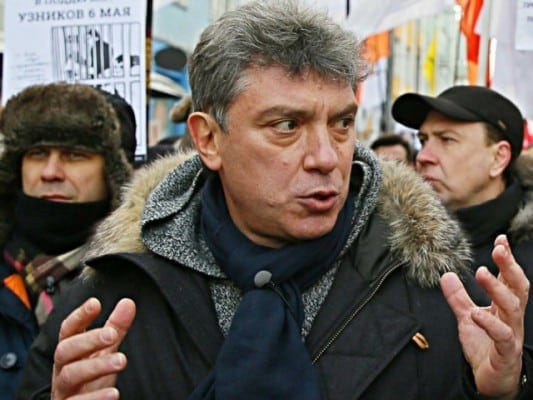
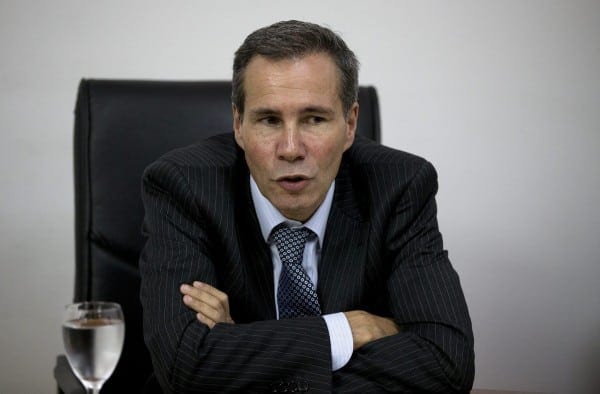

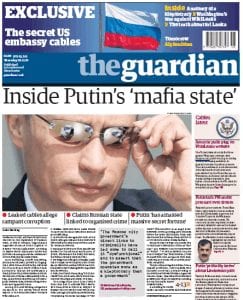



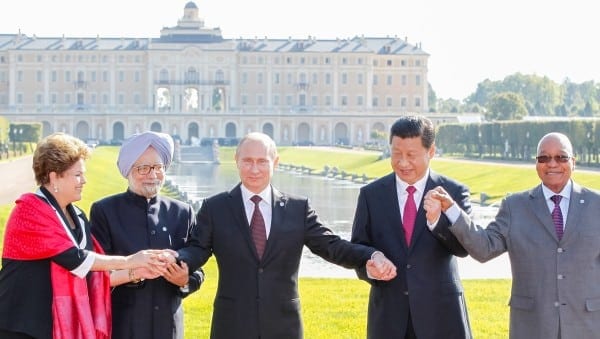
![navy-admiral_zheng_he-[1]](https://www.greanvillepost.com/wp-content/uploads/2015/07/navy-admiral_zheng_he-1-311x400.jpg)

![navy-Nanjing_Treasure_Ship_model_-_interior_-_P1070992[1]](https://www.greanvillepost.com/wp-content/uploads/2015/07/navy-Nanjing_Treasure_Ship_model_-_interior_-_P10709921-533x400.jpg)
